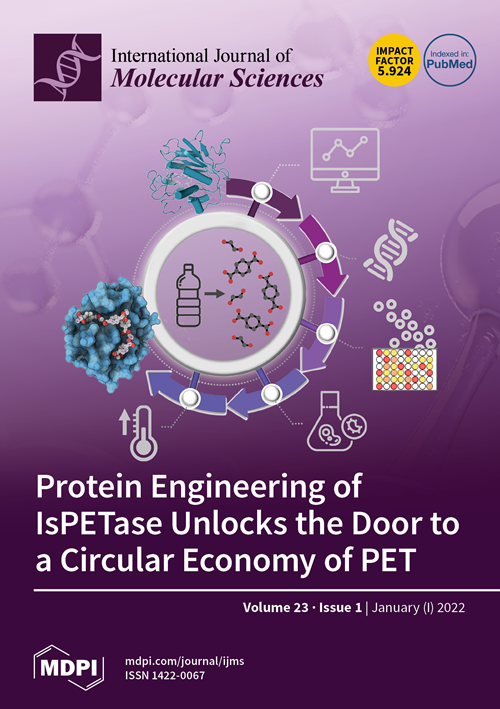亚甲基四氢叶酸还原酶基因多态性在同型半胱氨酸代谢及相关文明病中的影响
IF 4.9
2区 生物学
Q1 BIOCHEMISTRY & MOLECULAR BIOLOGY
引用次数: 0
摘要
亚甲基四氢叶酸还原酶(MTHFR)是一碳循环中的一种关键调节酶。这种酶对蛋氨酸、叶酸和 RNA 的代谢以及蛋白质、DNA 和 RNA 的生成至关重要。MTHFR 催化 5,10-亚甲基四氢叶酸向其活性形式 5-甲基四氢叶酸的不可逆转化,而 5-甲基四氢叶酸是同型半胱氨酸再甲基化为蛋氨酸的辅助底物。已确认的 MTHFR 基因变异体很多,其中 C677T 变异体的研究最为广泛。C677T 多态性导致缬氨酸在密码子 222 处转化为丙氨酸,与酶的活性降低和热稳定性增加有关。MTHFR 效率受损与同型半胱氨酸水平升高有关,而同型半胱氨酸水平升高会导致活性氧生成增加,并形成氧化应激。同型半胱氨酸被认为是心血管疾病的独立风险因素,而慢性炎症则是这些问题的共同潜在因素。许多研究都是为了确定 C677T 多态性与心血管疾病、高血压、糖尿病和超重/肥胖风险增加之间是否存在关联。尽管有几项研究得出结论认为该多态性不能可靠地用于预测,但仍有大量证据支持这种关联。本综述探讨了有关 MTHFR 多态性及其与心血管疾病、肥胖症和表观遗传调控的相关性的最新研究。本文章由计算机程序翻译,如有差异,请以英文原文为准。
The Implication of a Polymorphism in the Methylenetetrahydrofolate Reductase Gene in Homocysteine Metabolism and Related Civilisation Diseases
Methylenetetrahydrofolate reductase (MTHFR) is a key regulatory enzyme in the one-carbon cycle. This enzyme is essential for the metabolism of methionine, folate, and RNA, as well as for the production of proteins, DNA, and RNA. MTHFR catalyses the irreversible conversion of 5,10-methylenetetrahydrofolate to its active form, 5-methyltetrahydrofolate, a co-substrate for homocysteine remethylation to methionine. Numerous variants of the MTHFR gene have been recognised, among which the C677T variant is the most extensively studied. The C677T polymorphism, which results in the conversion of valine to alanine at codon 222, is associated with reduced activity and an increased thermolability of the enzyme. Impaired MTHFR efficiency is associated with increased levels of homocysteine, which can contribute to increased production of reactive oxygen species and the development of oxidative stress. Homocysteine is acknowledged as an independent risk factor for cardiovascular disease, while chronic inflammation serves as the common underlying factor among these issues. Many studies have been conducted to determine whether there is an association between the C677T polymorphism and an increased risk of cardiovascular disease, hypertension, diabetes, and overweight/obesity. There is substantial evidence supporting this association, although several studies have concluded that the polymorphism cannot be reliably used for prediction. This review examines the latest research on MTHFR polymorphisms and their correlation with cardiovascular disease, obesity, and epigenetic regulation.
求助全文
通过发布文献求助,成功后即可免费获取论文全文。
去求助
来源期刊

International Journal of Molecular Sciences
Chemistry-Organic Chemistry
CiteScore
8.10
自引率
10.70%
发文量
13472
审稿时长
17.49 days
期刊介绍:
The International Journal of Molecular Sciences (ISSN 1422-0067) provides an advanced forum for chemistry, molecular physics (chemical physics and physical chemistry) and molecular biology. It publishes research articles, reviews, communications and short notes. Our aim is to encourage scientists to publish their theoretical and experimental results in as much detail as possible. Therefore, there is no restriction on the length of the papers or the number of electronics supplementary files. For articles with computational results, the full experimental details must be provided so that the results can be reproduced. Electronic files regarding the full details of the calculation and experimental procedure, if unable to be published in a normal way, can be deposited as supplementary material (including animated pictures, videos, interactive Excel sheets, software executables and others).
 求助内容:
求助内容: 应助结果提醒方式:
应助结果提醒方式:


